China and Covid19
The End to Zero Covid: China’s New 10 Covid Rules Are Here
“Everyone is really happy but there is a black cloud heading our way.”
Published
2 years agoon

Over the past few weeks, China’s Covid measures have seen gradual changes, and various places across China have eased local rules regarding nucleic acid testing and the accessibility of public transport and venues. Now, central authorities have announced more measures that basically end the ‘zero Covid’ policy as we knew it. The ‘ten new rules’ became top trending on Weibo.
Just a month ago, on November 11, Chinese central authorities released a set of twenty new rules to “further optimize” China’s approach to Covid.
At the time, Chinese media emphasized that the new rules did not mean that China was letting go of its dynamic Zero Covid policy. Now, another ten new rules have been introduced that do indicate that the country is clearly no longer sticking to its ‘zero Covid’ goals.
After a central meeting that took place on December 6, authorities released a 10-point plan addressing changes in Covid measures. National Health Commission spokesman Mi Feng (米锋) announced the measures during a live-streamed press conference of the Joint Prevention and Control Mechanism of the State Council (#国务院联防联控机制发布会#).
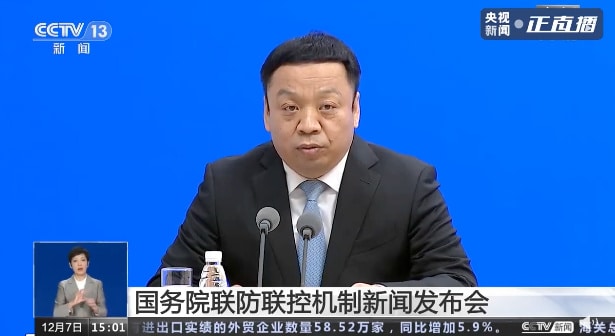
On Wednesday, several hashtags related to the new measures went trending on Chinese social media, including “Health Code” (#健康码#), over 450 million views), and “Ten New Rules” (#新十条#, over 440 million views).
These Are the 10 Changes:
1: Lockdown Changes
Risk areas should be assessed and divided according to science and it should be done precisely. We should no longer see the lockdown of an entire community or residential area; instead, it will be assessed by looking at household units, buildings, and apartment floors. The (temporary) closure of areas will no longer be allowed.
2: Testing Changes
The scope of nucleic acid testing was already limited in the previous adjusted rules, but will now be further limited. Instead of RT-PCR tests, rapid PCR tests will be used more often in accordance with local requirements. Nucleic acid testing will remain in place for high-risk positions and high-risk area personnel in accordance with relevant regulations, and some places including nursing homes, schools, and medical care institutions will still require negative tests, but negative nucleic acid test certificates and health code checks will no longer be necessary for traveling from place to place.
3: Quarantine Changes
People who tested positive but are asymptomatic or only show mild symptoms can isolate at home if they meet local requirements. Centralized isolation centers will still be in operation for more severe cases or those opting in for centralized quarantine. If nucleic acid tests are negative after the fifth day, the isolation period can end.
4: ‘High-Risk Area’ Changes
If no new cases have been detected for five consecutive days, local lockdowns should be lifted.
5: Medicine Availability Changes
Pharmacies should operate normally and cannot be arbitrarily closed. Over-the-counter (OTC) medicines for cough, fever, etc should not be restricted.
6: Vaccination Strategy Changes
The promotion of the Covid vaccination should be stepped up for Chinese seniors, especially in the 60-79 age group, with a clear focus on making sure they get all the vaccinations they need as quickly as possible. In order to boost the vaccination rates, temporary vaccination sites will need to be set up and they will need to be local incentives to get the seniors to vaccinate asap. This was actually also mentioned in the list of twenty optimized Covid measures in November (under rule 12).
7: Medical Classification Clarity
There should be clearer knowledge on the medical status of residents and whether elderly residents have any underlying medical issues and if they have been vaccinated.
8: Focus on the Normal Functioning of Society & Basic Medical Services
If areas are not classified as high-risk areas, people should be allowed to move around freely and have access to basic medical care, and there should be no restrictions on production, work, and business operations.
9: Strengthen Safety Procedures in Epidemic Situations
Buildings [in high-risk areas] cannot block fire exits, unit doors, or community gates under any circumstances. Community management departments should have effective modes of communication systems in place to contact local medical institutions in order to safeguard the medical needs of residents, including seniors living alone, children, pregnant women, and those with underlying conditions.
10: Improved Policies regarding Outbreaks at School Campuses
As also mentioned in the previous updated rules, on-campus epidemic control must be consistent, precise, and in accordance with science. Not only can there be no unnecessarily long lockdowns of campuses, but the risk areas within campuses should be more precisely defined, and normal teaching and living outside these areas should be able to continue as usual. Schools without any outbreaks should carry on normal offline teaching activities, and capus facilities such as supermarkets, cafeterias, libraries, etc. should be open.
Online Responses
One clear online response to China’s recent ‘optimized’ Covid measures is that people are buying a lot of medication, expecting to be infected with Covid soon. Some online stores had already sold out on the Traditional Chinese medicine Lianhua Qingwen (连花清瘟), a herbal pill by Yiling Pharmaceuticals which is used for the treatment of influenza as well as Covid.

Sold-out Lianhua Qingwen pills.
One popular Weibo blogger (@咖啡布偶猫) wrote: “I feel as if the propaganda has seen a sudden change in direction. During the first half of the year and the epidemic in Shanghai, everyone would get scared the moment you talked about a positive case, they wanted to fiercely chase it and thoroughly reach zero cases. Now they are propagating that we should not panic, that we should accept the reality and actively respond to it, as if it is nothing alarming. But we should still pay attention to those with underlying medical conditions, those with respiratory issues, asthma, and lung disease. If you haven’t bought cold medicine yet, do so. Right now, some places even have a limit on buying Lianhua Qingwen.”
During the December 7 press conference, Guo Yanhong (郭燕红), director of the National Health Commission’s health emergency division, emphasized that it is not necessary for people to stock up on medication in light of the announced eased Covid measures and that there are sufficient supplies (#卫健委提示没有必要囤积抢购药物#).
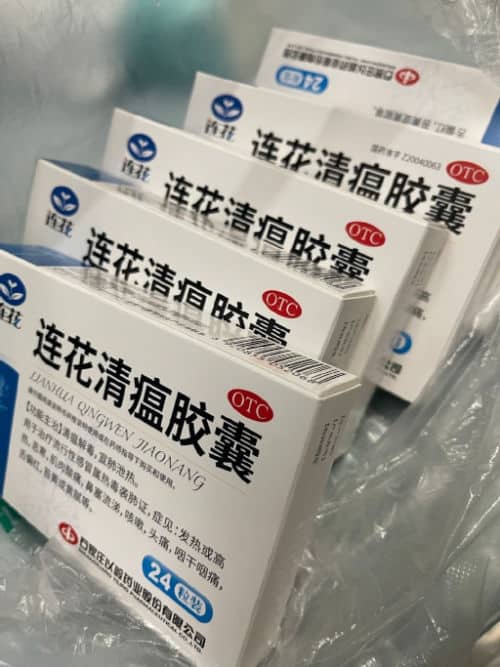
“After being sealed for three years, it’s all lifted in a morning, all the prices go up for Lianhua Qingwen, rapid antigen tests increase in price, and if your symptoms get serious you’re still not able to get help anywhere.”

Some jokingly suggest that after messing around for three years, the pandemic is only now really starting.
“Everyone is really happy now but there’s a black cloud coming our way, we will know in a month or so if it is going to be light drizzle or a heavy rainstorm.”
By Manya Koetse , with contributions by Miranda Barnes
Get the story behind the hashtag. Subscribe to What’s on Weibo here to receive our newsletter and get access to our latest articles:
Spotted a mistake or want to add something? Please let us know in the comments below or email us. First-time commenters, please be patient – we will have to manually approve your comment before it appears.
©2022 Whatsonweibo. All rights reserved. Do not reproduce our content without permission – you can contact us at info@whatsonweibo.com.
Manya Koetse is the founder and editor-in-chief of whatsonweibo.com. She is a writer, public speaker, and researcher (Sinologist, MPhil) on social trends, digital developments, and new media in an ever-changing China, with a focus on Chinese society, pop culture, and gender issues. She shares her love for hotpot on hotpotambassador.com. Contact at manya@whatsonweibo.com, or follow on Twitter.

Also Read
China and Covid19
Sick Kids, Worried Parents, Overcrowded Hospitals: China’s Peak Flu Season on the Way
“Besides Mycoplasma infections, cases include influenza, Covid-19, Norovirus, and Adenovirus. Heading straight to the hospital could mean entering a cesspool of viruses.”
Published
8 months agoon
November 22, 2023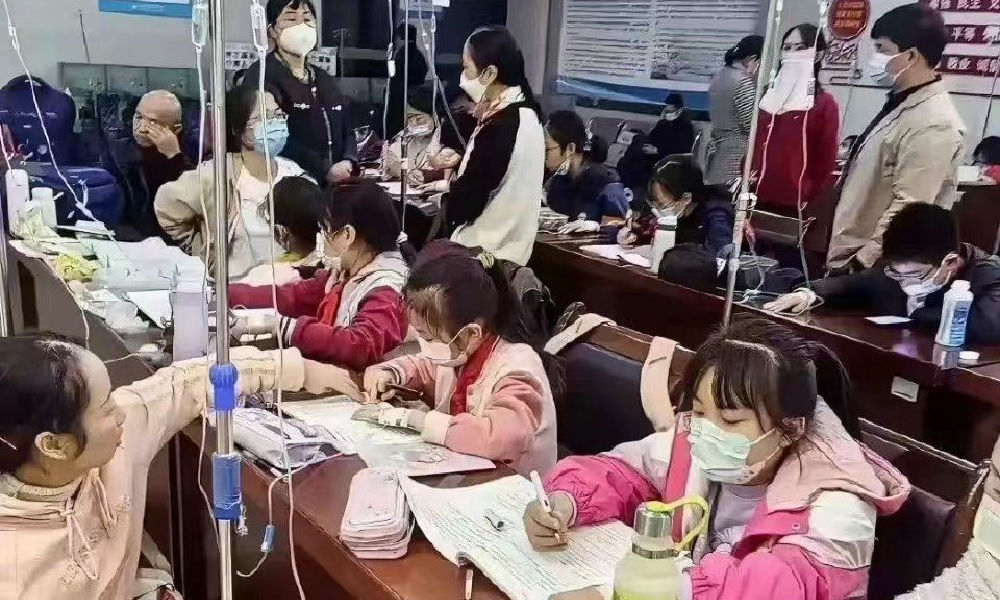
In the early morning of November 21, parents are already queuing up at Xi’an Children’s Hospital with their sons and daughters. It’s not even the line for a doctor’s appointment, but rather for the removal of IV needles.
The scene was captured in a recent video, only one among many videos and images that have been making their rounds on Chinese social media these days (#凌晨的儿童医院拔针也要排队#).
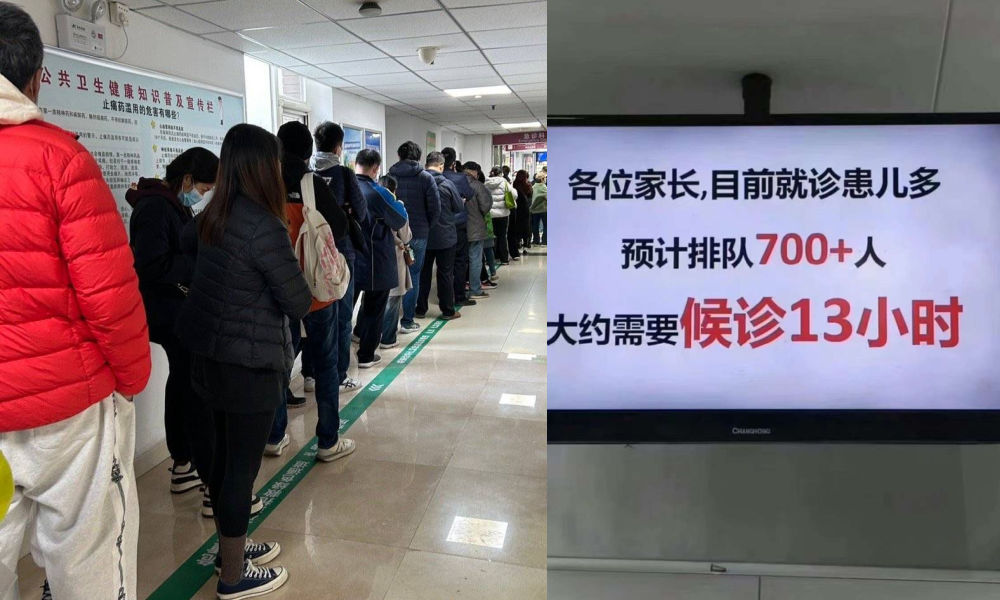
One photo shows a bulletin board at a local hospital warning parents that over 700 patients are waiting in line, estimating a waiting time of more than 13 hours to see a doctor.
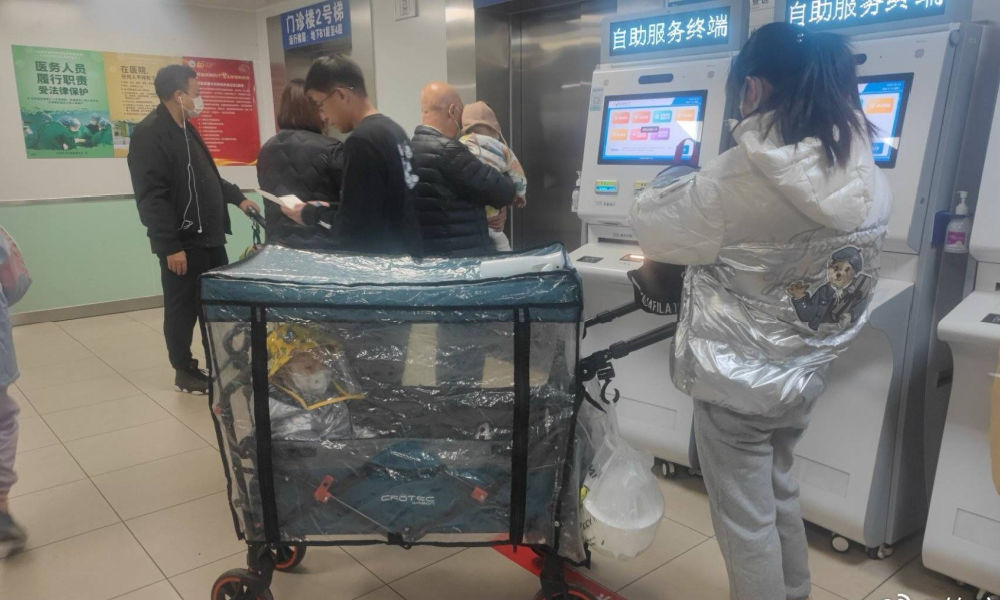
Another image shows children doing their homework while hooked up on an IV.

Recent discussions on Chinese social media platforms have highlighted a notable surge in flu cases. The ongoing flu season is particularly impacting children, with multiple viruses concurrently circulating and contributing to a high incidence of respiratory infections.
Among the prevalent respiratory infections affecting children are Mycoplasma pneumoniae infections, influenza, and Adenovirus infection.
The spike in flu cases has resulted in overcrowded children’s hospitals in Beijing and other Chinese cities. Parents sometimes have to wait in line for hours to get an appointment or pick up medication.
According to one reporter at Haibao News (海报新闻), there were so many patients at the Children’s Hospital of Capital Institute of Pediatrics (首都儿科研究所) on November 21st that the outpatient desk stopped accepting new patients by the afternoon. Meanwhile, 628 people were waiting in line to see a doctor at the emergency department.
Reflecting on the past few years, the current flu season marks China’s first ‘normal’ flu peak season since the outbreak of Covid-19 in late 2019 / early 2020 and the end of its stringent zero-Covid policies in December 2022. Compared to many other countries, wearing masks was also commonplace for much longer following the relaxation of Covid policies.
Hu Xijin, the well-known political commentator, noted on Weibo that this year’s flu season seems to be far worse than that of the years before. He also shared that his own granddaughter was suffering from a 40 degrees fever.
“We’re all running a fever in our home. But I didn’t dare to go to the hospital today, although I want my child to go to the hospital tomorrow. I heard waiting times are up to five hours now,” one Weibo user wrote.
“Half of the kids in my child’s class are sick now. The hospital is overflowing with people,” another person commented.
One mother described how her 7-year-old child had been running a fever for eight days already. Seeking medical attention on the first day, the initial diagnosis was a cold. As the fever persisted, daily visits to the hospital ensued, involving multiple hours for IV fluid administration.
While this account stems from a single Weibo post within a fever-advice community, it highlights a broader trend: many parents swiftly resort to hospital visits at the first signs of flu or fever. Several factors contribute to this, including a lack of General Practitioners in China, making hospitals the primary choice for medical consultations also in non-urgent cases.
There is also a strong belief in the efficacy of IV infusion therapy, whether fluid-based or containing medication, as the quickest path to recovery. Multiple factors contribute to the widespread and sometimes irrational use of IV infusions in China. Some clinics are profit-driven and see IV infusions as a way to make more money. Widespread expectations among Chinese patients that IV infusions will make them feel better also play a role, along with some physicians’ lacking knowledge of IV therapy or their uncertainty to distinguish bacterial from viral infections (read more here)
To prevent an overwhelming influx of patients to hospitals, Chinese state media, citing specialists, advise parents to seek medical attention at the hospital only for sick infants under three months old displaying clear signs of fever (with or without cough). For older children, it is recommended to consult a doctor if a high fever persists for 3 to 5 days or if there is a deterioration in respiratory symptoms. Children dealing with fever and (mild) respiratory symptoms can otherwise recover at home.
One Weibo blogger (@奶霸知道) warned parents that taking their child straight to the hospital on the first day of them getting sick could actually be a bad idea. They write:
“(..) pediatric departments are already packed with patients, and it’s not just Mycoplasma infections anymore. Cases include influenza, Covid-19, Norovirus, and Adenovirus. And then, of course, those with bad luck are cross-infected with multiple viruses at the same time, leading to endless cycles. Therefore, if your child experiences mild coughing or a slight fever, consider observing at home first. Heading straight to the hospital could mean entering a cesspool of viruses.”
The hashtag for “fever” saw over 350 million clicks on Weibo within one day on November 22.
Meanwhile, there are also other ongoing discussions on Weibo surrounding the current flu season. One topic revolves around whether children should continue doing their homework while receiving IV fluids in the hospital. Some hospitals have designated special desks and study areas for children.
Although some commenters commend the hospitals for being so considerate, others also remind the parents not to pressure their kids too much and to let them rest when they are not feeling well.
Opinions vary: although some on Chinese social media say it's very thoughtful for hospitals to set up areas where kids can study and read, others blame parents for pressuring their kids to do homework at the hospital instead of resting when not feeling well. pic.twitter.com/gnQD9tFW2c
— Manya Koetse (@manyapan) November 22, 2023
By Manya Koetse, with contributions from Miranda Barnes
Get the story behind the hashtag. Subscribe to What’s on Weibo here to receive our newsletter and get access to our latest articles:
Spotted a mistake or want to add something? Please let us know in comments below or email us. First-time commenters, please be patient – we will have to manually approve your comment before it appears.
©2023 Whatsonweibo. All rights reserved. Do not reproduce our content without permission – you can contact us at info@whatsonweibo.com.
China and Covid19
Repurposing China’s Abandoned Nucleic Acid Booths: 10 Innovative Transformations
Abandoned nucleic acid booths are getting a second life through these new initiatives.
Published
1 year agoon
May 19, 2023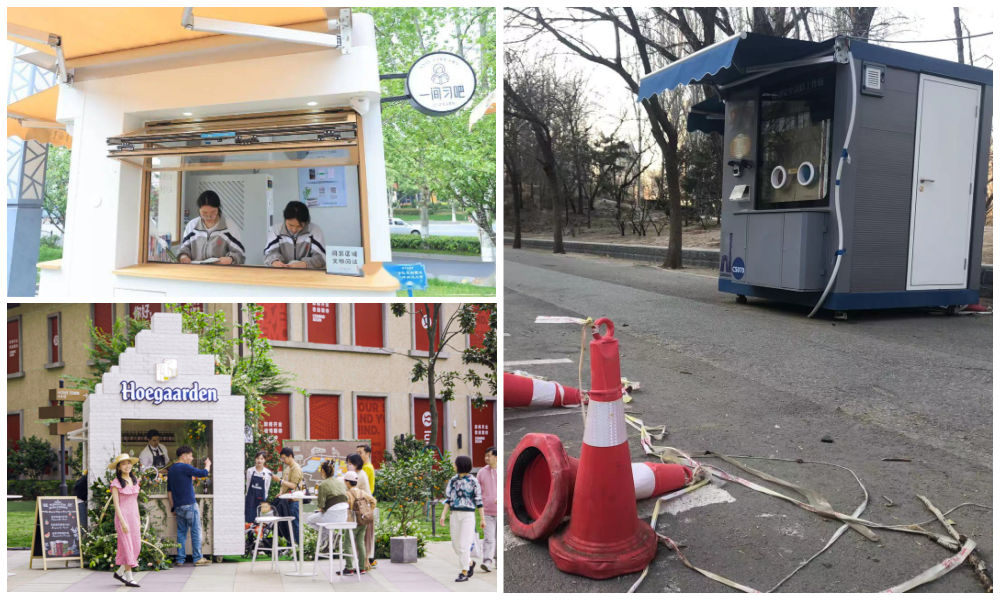
During the pandemic, nucleic acid testing booths in Chinese cities were primarily focused on maintaining physical distance. Now, empty booths are being repurposed to bring people together, serving as new spaces to serve the community and promote social engagement.
Just months ago, nucleic acid testing booths were the most lively spots of some Chinese cities. During the 2022 Shanghai summer, for example, there were massive queues in front of the city’s nucleic acid booths, as people needed a negative PCR test no older than 72 hours for accessing public transport, going to work, or visiting markets and malls.
The word ‘hésuān tíng‘ (核酸亭), nucleic acid booth (also:核酸采样小屋), became a part of China’s pandemic lexicon, just like hésuān dìtú (核酸地图), the nucleic acid test map lauched in May 2022 that would show where you can get a nucleic test.
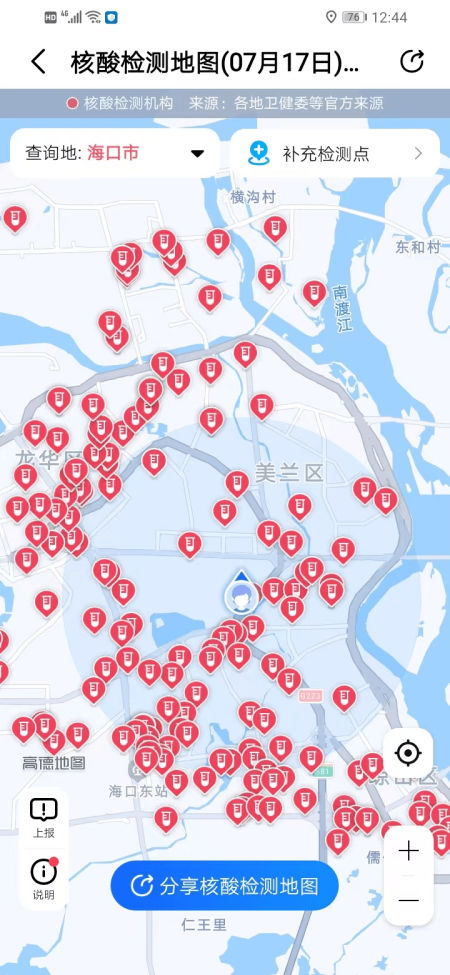
Example of nucleic acid test map.
During Halloween parties in Shanghai in 2022, some people even came dressed up as nucleic test booths – although local authorities could not appreciate the creative costume.
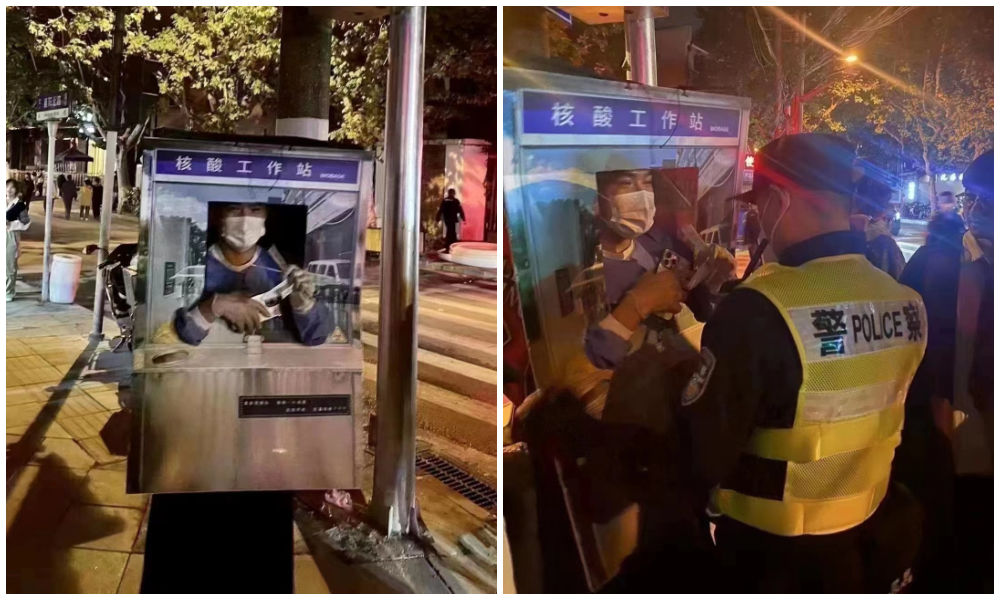
Halloween 2022: dressed up as nucliec acid booths. Via @manyapan twitter.
In December 2022, along with the announced changed rules in China’s ‘zero Covid’ approach, nucleic acid booths were suddenly left dismantled and empty.
With many cities spending millions to set up these booths in central locations, the question soon arose: what should they do with the abandoned booths?
This question also relates to who actually owns them, since the ownership is mixed. Some booths were purchased by authorities, others were bought by companies, and there are also local communities owning their own testing booths. Depending on the contracts and legal implications, not all booths are able to get a new function or be removed yet (Worker’s Daily).
In Tianjin, a total of 266 nucleic acid booths located in Jinghai District were listed for public acquisition earlier this month, and they were acquired for 4.78 million yuan (US$683.300) by a local food and beverage company which will transform the booths into convenience service points, selling snacks or providing other services.
Tianjin is not the only city where old nucleic acid testing booths are being repurposed. While some booths have been discarded, some companies and/or local governments – in cooperation with local communities – have demonstrated creativity by transforming the booths into new landmarks. Since the start of 2023, different cities and districts across China have already begun to repurpose testing booths. Here, we will explore ten different way in which China’s abandoned nucleic test booths get a second chance at a meaningful existence.
1: Pharmacy/Medical Booths
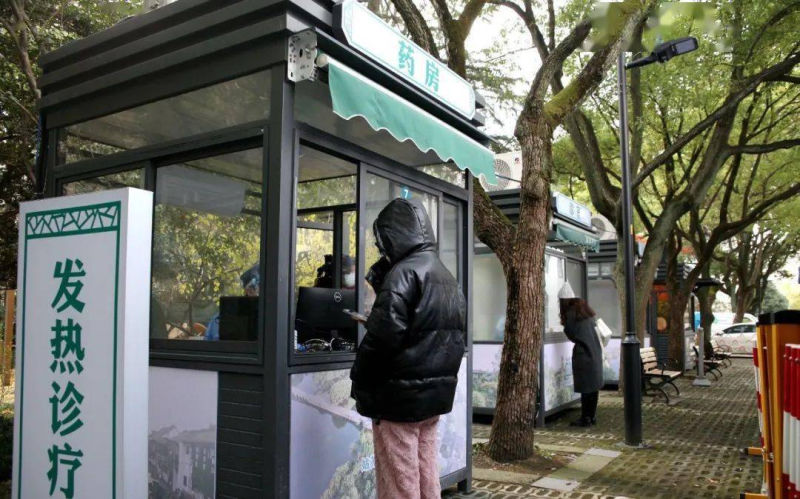
Via ‘copyquan’ republished on Sohu.
Blogger ‘copyquan’ recently explored various ways in which abandoned PCR testing points are being repurposed.
One way in which they are used is as small pharmacies or as medical service points for local residents (居民医疗点). Alleviating the strain on hospitals and pharmacies, this was one of the earliest ways in which the booths were repurposed back in December of 2022 and January of 2023.
Chongqing, Tianjin, and Suzhou were among earlier cities where some testing booths were transformed into convenient medical facilities.
2: Market Stalls
In Suzhou, Jiangsu province, the local government transformed vacant nucleic acid booths into market stalls for the Spring Festival in January 2022, offering them free of charge to businesses to sell local products, snacks, and traditional New Year goods.
The idea was not just meant as a way for small businesses to conveniently sell to local residents, it was also meant as a way to attract more shoppers and promote other businesses in the neighborhood.
3: Community Service Center

Small grid community center in Shizhuang Village, image via Sohu.
Some residential areas have transformed their local nucleic acid testing booths into community service centers, offering all kinds of convenient services to neighborhood residents.
These little station are called wǎnggé yìzhàn (网格驿站) or “grid service stations,” and they can serve as small community centers where residents can get various kinds of care and support.
4: “Refuel” Stations
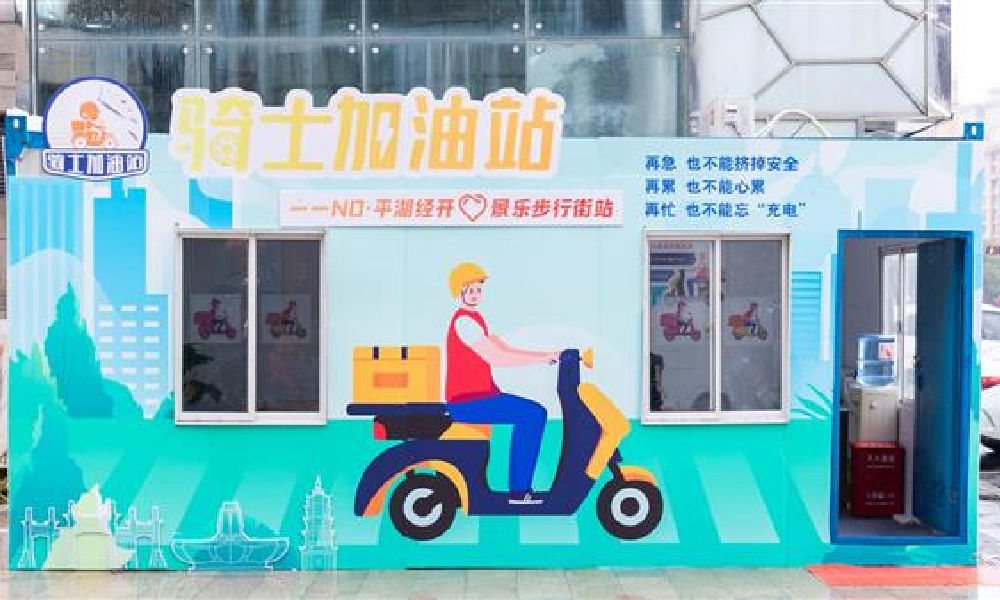
In February of this year, 100 idle nucleic acid sampling booths were transformed into so-called “Rider Refuel Stations” (骑士加油站) in Zhejiang’s Pinghu. Although it initially sounds like a place where delivery riders can fill up their fuel tanks, it is actually meant as a place where they themselves can recharge.
Delivery riders and other outdoor workers can come to the ‘refuel’ station to drink some water or tea, warm their hands, warm up some food and take a quick nap.
5: Free Libraries
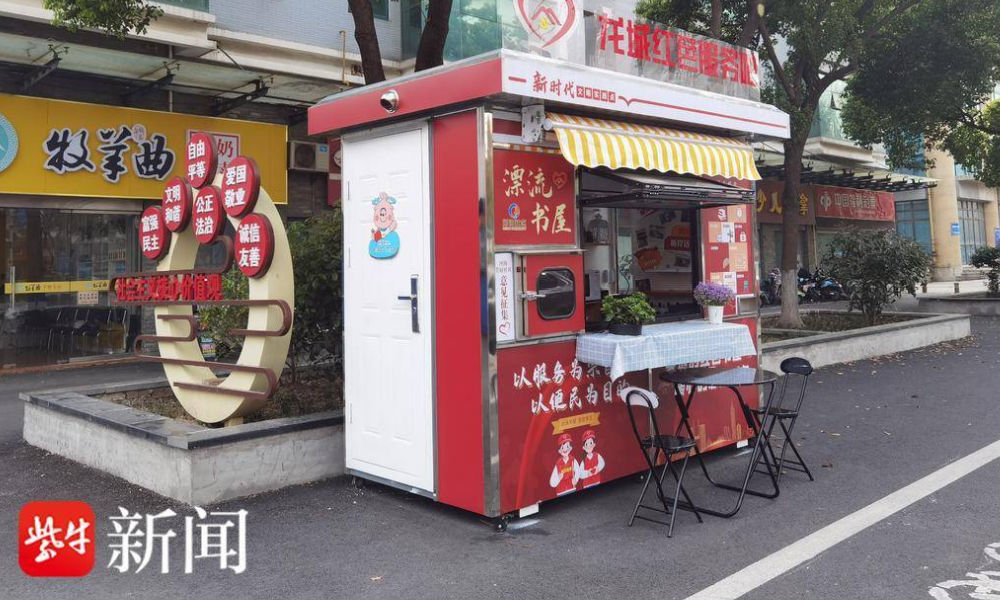
image via sohu.
In various Chinese cities, abandoned nucleic acid booths have been transformed into little free libraries where people can grab some books to read, donate or return other books, and sit down for some reading.
Changzhou is one of the places where you’ll find such “drifting bookstores” (漂流书屋) (see video), but similar initiatives have also been launched in other places, including Suzhou.
6: Study Space
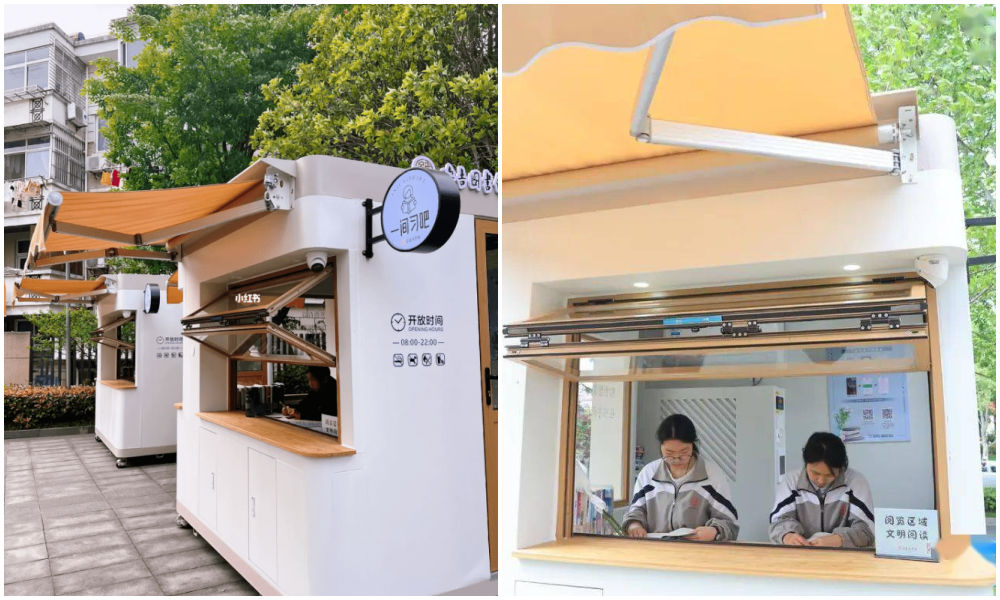
Photos via Copyquan’s article on Sohu.
Another innovative way in which old testing points are being repurposed is by turning them into places where students can sit together to study. The so-called “Let’s Study Space” (一间习吧), fully airconditioned, are opened from 8 in the morning until 22:00 at night.
Students – or any citizens who would like a nice place to study – can make online reservations with their ID cards and scan a QR code to enter the study rooms.
There are currently ten study booths in Anji, and the popular project is an initiative by the Anji County Library in Zhejiang (see video).
7: Beer Kiosk
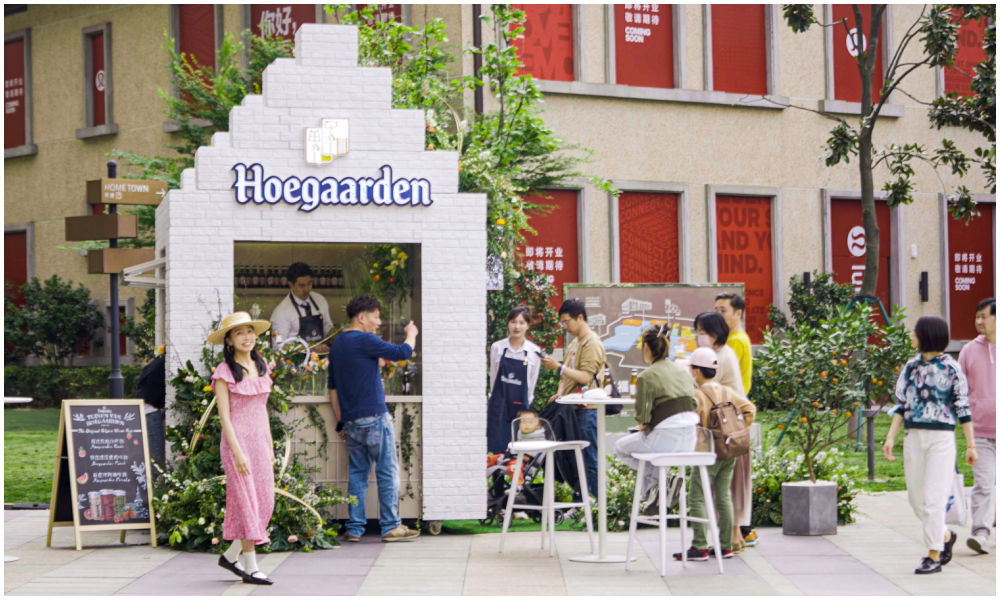
Hoegaarden beer shop, image via Creative Adquan.
Changing an old nucleic acid testing booth into a beer bar is a marketing initiative by the Shanghai McCann ad agency for the Belgium beer brand Hoegaarden.
The idea behind the bar is to celebrate a new spring after the pandemic. The ad agency has revamped a total of six formr nucleic acid booths into small Hoegaarden ‘beer gardens.’
8: Police Box
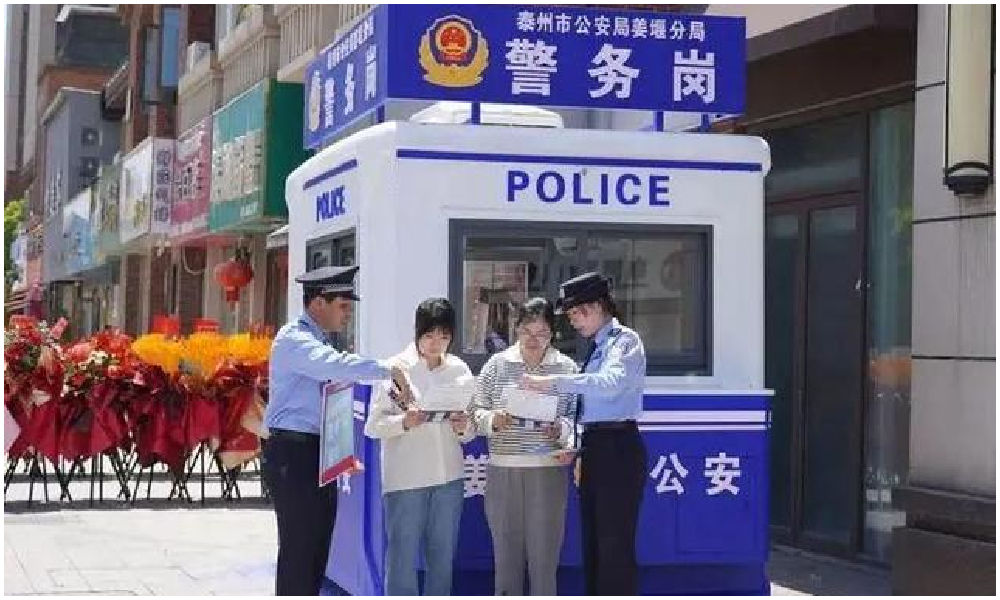
In Taizhou City, Jiangsu Province, authorities have repurposed old testing booths and transformed them into ‘police boxes’ (警务岗亭) to enhance security and improve the visibility of city police among the public.
Currently, a total of eight vacant nucleic acid booths have been renovated into modern police stations, serving as key points for police presence and interaction with the community.
9: Lottery Ticket Booths
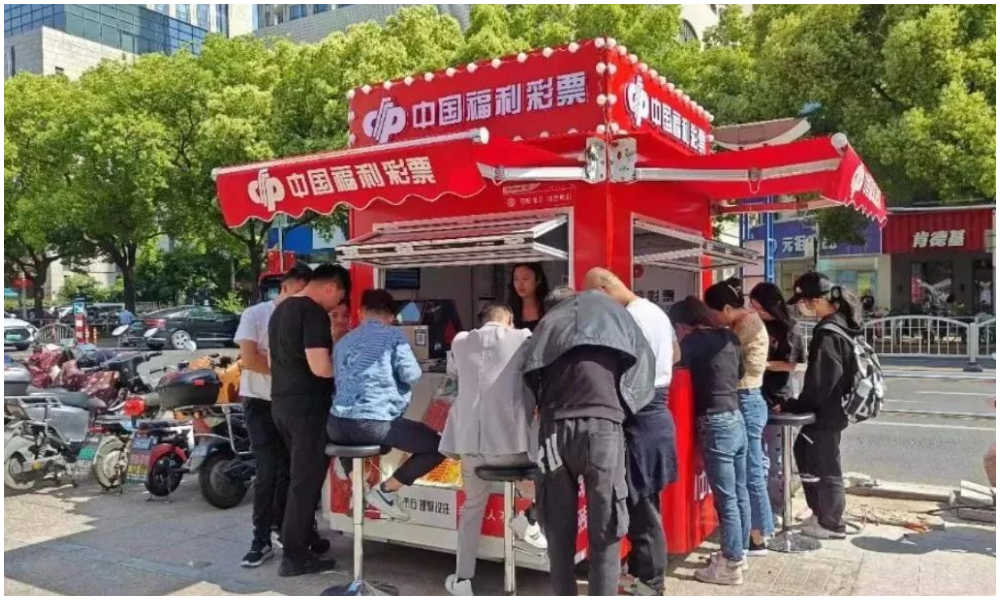
Image via The Paper
Some nucleic acid booths have now been turned into small shops selling lottery tickets for the China Welfare Lottery. One such place turning the kiosks into lottery shops is Songjiang in Shanghai.
Using the booths like this is a win-win situation: they are placed in central locations so it is more convenient for locals to get their lottery tickets, and on the other hand, the sales also help the community, as the profits are used for welfare projects, including care for the elderly.
10: Mini Fire Stations
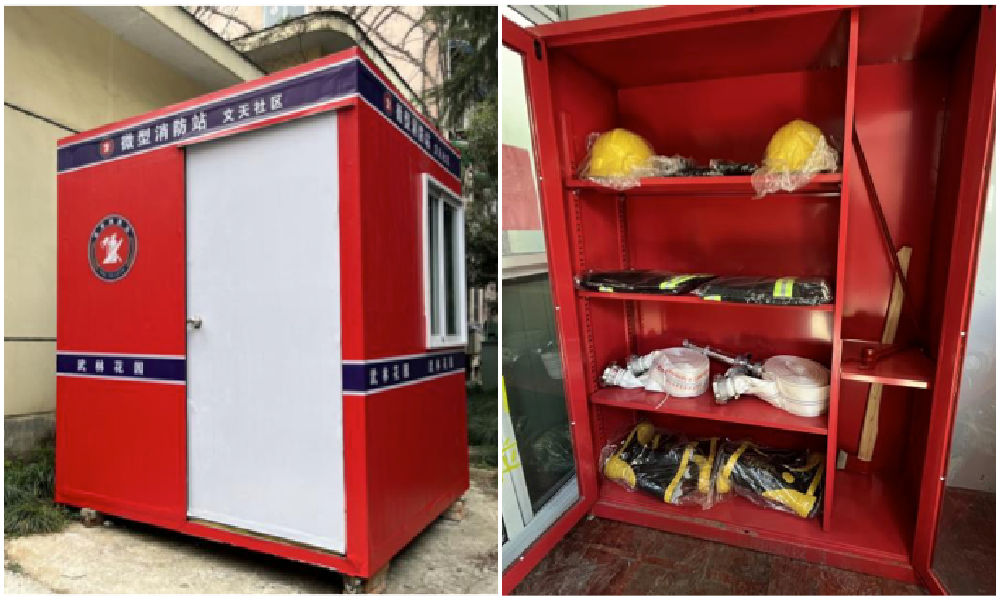
Micro fire stations, images via ZjNews.
Some communities decided that it would be useful to repurpose the testing points and turn them into mini fire kiosks, just allowing enough space for the necessary equipment to quickly respond to fire emergencies.
Want to read more about the end of ‘zero Covid’ in China? Check our other articles here.
By Manya Koetse,
Get the story behind the hashtag. Subscribe to What’s on Weibo here to receive our newsletter and get access to our latest articles:
Spotted a mistake or want to add something? Please let us know in comments below or email us. First-time commenters, please be patient – we will have to manually approve your comment before it appears.
©2023 Whatsonweibo. All rights reserved. Do not reproduce our content without permission – you can contact us at info@whatsonweibo.com.
Subscribe

Weibo Watch: The Future is Here

“Bye Bye Biden”: Biden’s Many Nicknames in Chinese

Enjoying the ‘Sea’ in Beijing’s Ditan Park

A Triumph for “Comrade Trump”: Chinese Social Media Reactions to Trump Rally Shooting

Weibo Watch: Get Up, Stand Up

The Tragic Story of “Fat Cat”: How a Chinese Gamer’s Suicide Went Viral

“Old Bull Eating Young Grass”: 86-Year-Old Chinese Painter Fan Zeng Marries 36-Year-Old Xu Meng

A Brew of Controversy: Lu Xun and LELECHA’s ‘Smoky’ Oolong Tea

Singing Competition or Patriotic Fight? Hunan TV’s ‘Singer 2024’ Stirs Nationalistic Sentiments

Zara Dress Goes Viral in China for Resemblance to Haidilao Apron

Weibo Watch: The Battle for the Bottom Bed

About the “AI Chatbot Based on Xi Jinping” Story

China’s Intensified Social Media Propaganda: “Taiwan Must Return to Motherland”

Weibo Watch: Telling China’s Stories Wrong

Saying Goodbye to “Uncle Wang”: Wang Wenbin Becomes Chinese Ambassador to Cambodia
Get in touch
Would you like to become a contributor, or do you have any tips or suggestions? Get in touch here!
Popular Reads
-

 China Insight3 months ago
China Insight3 months agoThe Tragic Story of “Fat Cat”: How a Chinese Gamer’s Suicide Went Viral
-

 China Music4 months ago
China Music4 months agoThe Chinese Viral TikTok Song Explained (No, It’s Not About Samsung)
-

 China Digital10 months ago
China Digital10 months agoToo Sexy for Weibo? Online Discussions on the Concept of ‘Cābiān’
-

 China Arts & Entertainment12 months ago
China Arts & Entertainment12 months agoBehind 8 Billion Streams: Who is Dao Lang Cursing in the Chinese Hit Song ‘Luocha Kingdom’?





